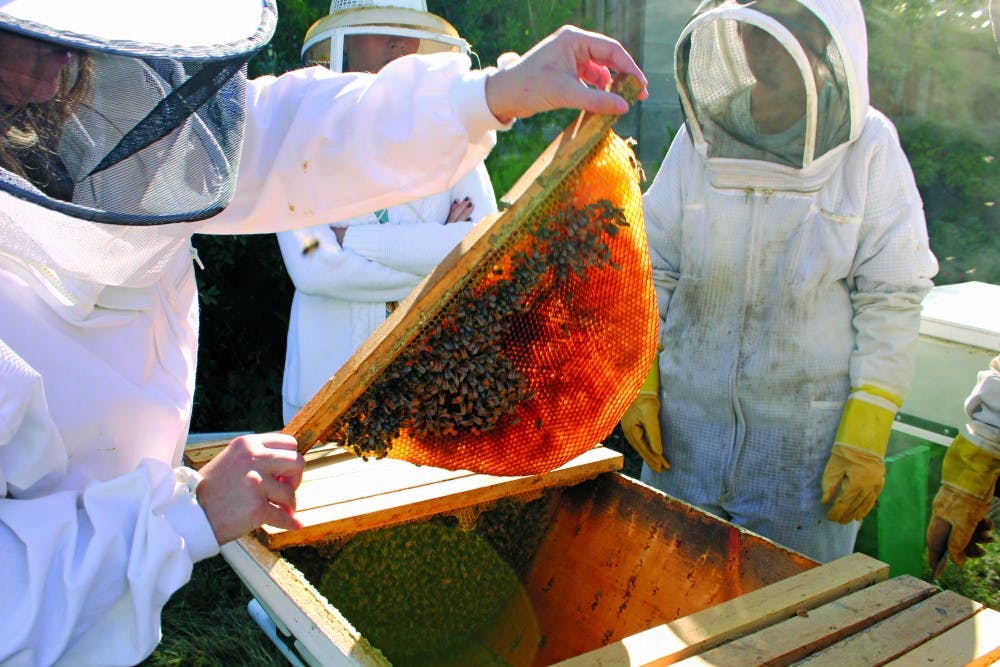Honeycomb glistened with golden morning hues as local beekeeper Bobby “Bee” Blanquez showed off one of his three honeybee hives to the University of New Mexico Beekeeping Club on Saturday.
Blanquez and his wife, Camille Cunningham, have been keeping bees since 2012.
"My name is Bee. That’s one reason (I began to keep bees)," Blanquez said. "We heard about bees dying, and once the bees go on Earth, you know that’s it. Our food supplies go out. We have bees because we want to support them."
The couple doesn’t keep bees for the honey harvest, but rather primarily for their pollination abilities. They haven’t harvested honey from a hive since the spring of 2018 when one of their colonies abandoned the hive, leaving honey behind.
"It's not for the honey, it’s for them. We do it for the bees," Blanquez said.
The bees roam the backyard among an array of colorful plants — which are pollinator favorites. In their garden, there are patches of lavender, rosemary, four o’clocks, a variety of sage and prickly pear cacti among many other plants.
"The cactus flowers are kind of like crack (for the bees)," Cunningham said. "You see them inside the flower and they are rolling around in the pollen. It’s really amazing."
The plants are maintained by Cunningham because according to Blanquez, he has a self-declared "brown thumb."
"I kind of like the wild look," Cunningham said about her pollinator garden.
Board after board of Blanquez and Cunningham’s top bar hive was shown to the group, each one containing more honeycomb and honeybees than the last.
The longer the hive was open, the more ornery the bees became — their buzzing intensified with every second almost as a warning to the others about the intruders in their home. However, not one sting occurred during the visit, and the bees overall were very docile.
As the hive was being closed, a dead bee was seen on one of the boards on top of the hive, stuck to a droplet of honey.
Get content from The Daily Lobo delivered to your inbox
"I’m sorry, bee. May you go to bee heaven," Blanquez said to the bee as he removed it from the hive and placed the insect on the ground. "I always feel guilty when I have to do that to them."
It is his ritual to honor them when he has to remove dead bees from the hive.
Of the several UNM students and faculty at the event, UNM Beekeeping Club former president and current member Elizabeth Lake was also in attendance.
She has been part of the club since its inception in the fall of 2015. She is the point person that regularly connects the club and the UNM community with local beekeepers to learn more about the practice.
"The semester is just starting up and bee season is just ending. And so that's the problem — the school year is the opposite of the bee year," Lake said. "So, it never works out quite perfectly."
Lake said that the most active time for honey bees begins about when spring semester finals roll around and last through the summer.
Because of this misalignment, Blanquez and Cunningham’s hives and pollinator garden are the club’s second group outing of the year.
UNM student Claire Burford learned about the UNM Beekeeping Club’s local hive and pollinator garden visit from her resident advisor in the Environmental Living Learning community on campus.
"I didn’t know what honey looked like in a hive or anything," Burford said. "I’ve never been around bees in a setting like this where they are being kept."
The UNM Beekeeping Club was originally founded as part of a class project through the Sustainability Studies Program at the University.
During the club's first year, their goal was to put a honeybee hive on campus. When this proved to be difficult due to the prime honeybee season being during summer, the direction of the organization shifted to native bee education — not just honey bees.
As more of the club’s members had hives themselves, the focus shifted again back to honeybee education and the group began to visit more local hives.
Makayla Grijalva is the managing editor at the Daily Lobo. She can be contacted at mangingeditor@dailylobo.com or on Twitter @MakaylaEliboria






